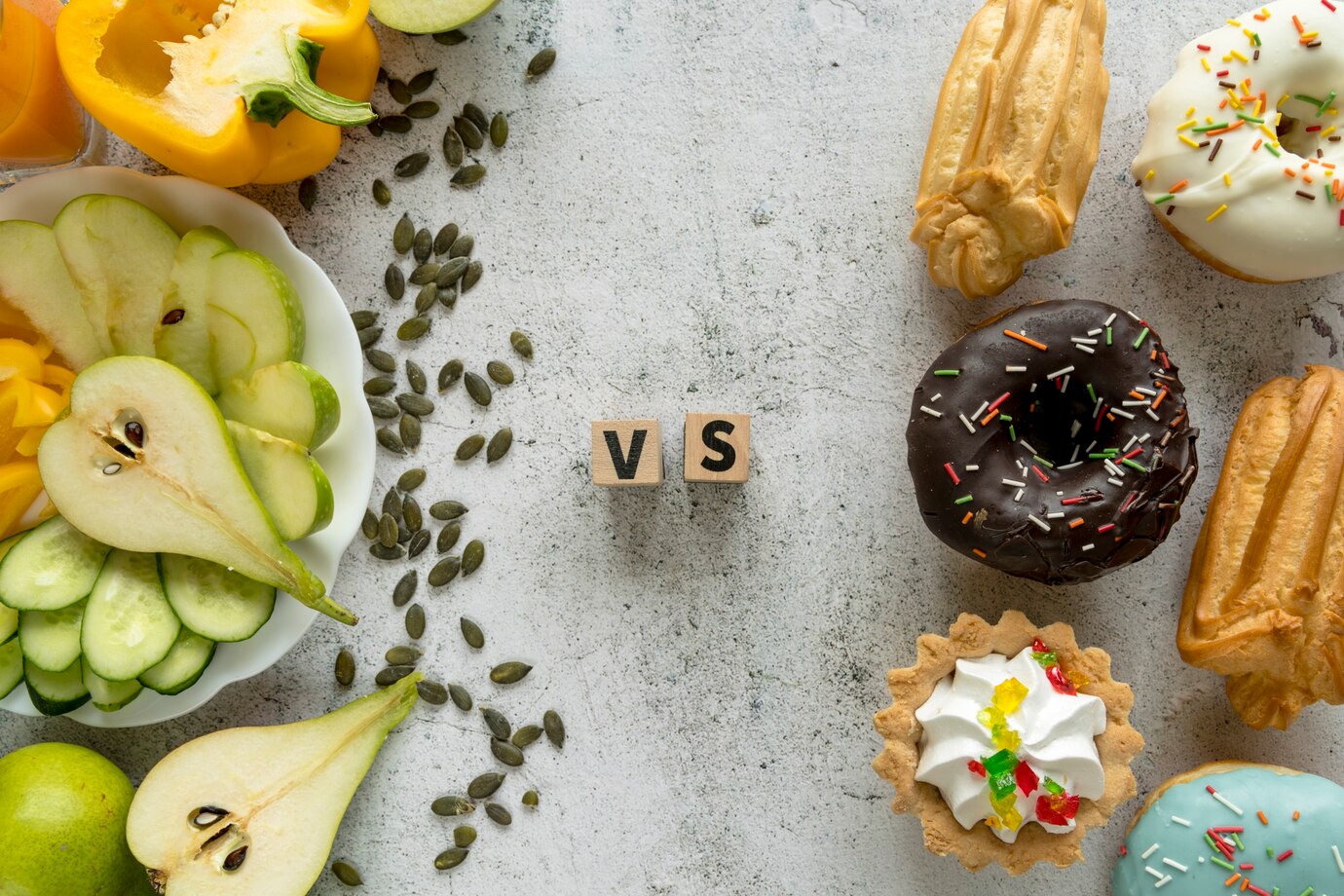
The Truth About Sugar: How It Affects Your Body
Sugar is a common part of our daily diet, but how much do we really know about its effects on our health? Natural sugars in fruits and dairy are important for good health. But eating too much-processed sugar can cause health problems. Understanding the sugar impact on health is crucial for making informed dietary choices. This guide explains the differences between processed sugar vs natural sugar. It also covers the risks of eating too much sugar and offers tips for cutting back. These tips will help in improving your overall well-being.
Understanding Sugar: The Basics

Sugar is a type of carbohydrate that provides a quick source of energy. It happens naturally in whole foods such as fruits, vegetables, and dairy. However, it’s often added in large amounts to processed foods.
Types of Sugar:
- Natural Sugar: Found in fruits (fructose), dairy (lactose), and some vegetables. These sources offer fiber, vitamins, and minerals. They help control blood sugar levels.
- Processed Sugar: Added to foods like sweets, fizzy drinks, and baked goods. These sugars lack essential nutrients and contribute to health issues.
Hopefully, you will recognise the differences between processed sugar vs natural sugar. This will help you make healthier dietary choices.
Sugar’s Impact on Health
Eating too much sugar can lead to health issues. These range from weight gain to chronic diseases. Learning the sugar impact on health can show the importance of mindful consumption.
1. Weight Gain and Obesity
Eating lots of processed sugar raises calorie intake without providing essential nutrients. Sugary foods and drinks raise blood sugar levels. This can make you feel hungrier and lead to overeating.
How Sugar Contributes to Weight Gain:
- Liquid calories from sugary drinks don’t provide satiety, leading to excessive consumption.
- High sugar intake increases insulin levels, promoting fat storage.
- Processed foods high in sugar often contain unhealthy fats, further increasing calorie intake.
2. Increased Risk of Type 2 Diabetes
Diets with a lot of added sugar can lead to insulin resistance. This is an important factor in developing type 2 diabetes.
Signs of Insulin Resistance:
- Constant hunger and sugar cravings.
- Fatigue and low energy levels.
- Increased abdominal fat.
3. Heart Disease and High Blood Pressure
Eating too much sugar can lead to inflammation. It also raises blood pressure and increases the risk of heart disease. A diet high in processed sugar can harm heart health, research shows.
How Sugar Affects Heart Health:
- High sugar intake increases triglyceride levels, a risk factor for heart disease.
- Processed sugar contributes to obesity, which increases the likelihood of high blood pressure.
- Excessive sugar consumption may lead to fatty liver disease, affecting overall heart function.
4. Impact on Brain Function and Mood
Eating too much sugar can cause mood swings, energy drops, and a higher chance of depression. Sugar gives a quick energy boost. However, too much sugar can harm brain function and emotional balance.
Mental Health Risks Associated with High Sugar Intake:
- Increased risk of anxiety and depression due to fluctuating blood sugar levels.
- Poor memory and cognitive decline in the long term.
- Sugar addiction and dependence lead to withdrawal symptoms when intake is reduced.
Processed Sugar vs Natural Sugar: Which is Better?
Understanding processed sugar vs natural sugar is essential when making dietary choices. While both types of sugar provide energy, their effects on the body are vastly different.
Processed Sugar:
- Found in sweets, fizzy drinks, baked goods, and processed foods.
- Provides empty calories with no essential nutrients.
- Causes rapid spikes and crashes in blood sugar levels.
- Contributes to obesity, diabetes, and heart disease.
Natural Sugar:
- Found in whole foods like fruits, dairy, and vegetables.
- Comes with fibre, vitamins, and antioxidants that support digestion and energy balance.
- Has a slower impact on blood sugar levels due to fibre content.
- Provides essential nutrients while satisfying sweet cravings naturally.
Choosing natural sources of sugar over-processed options can significantly improve overall health.
Tips for Reducing Sugar Intake

Making small changes in your diet can help in reducing sugar intake. You won’t even feel deprived. Here are some practical ways to cut down on processed sugar:
1. Read Food Labels
- Check ingredient lists for hidden sugars like sucrose, glucose, and high-fructose corn syrup.
- Choose products with little to no added sugar.
2. Opt for Natural Sweeteners
- Replace white sugar with natural alternatives like honey, maple syrup, or dates.
- Be mindful of portion sizes as natural sweeteners still contain sugar.
3. Eat Whole Foods
- Incorporate more fruits, vegetables, and whole grains into your diet.
- These foods provide natural sugar along with essential fibre and nutrients.
4. Avoid Sugary Drinks
- Swap fizzy drinks and fruit juices for water, herbal tea, or infused water with fresh fruits.
- Many drinks contain hidden sugars that contribute to excessive calorie intake.
5. Prepare Meals at Home
- Cooking from scratch allows you to control the sugar content in your meals.
- Experiment with herbs and spices to enhance flavour naturally.
6. Be Mindful of Portion Sizes
- Gradually reduce the amount of sugar in your tea, coffee, and homemade desserts.
- Over time, your taste buds will adjust to lower sugar levels.
7. Get Enough Sleep and Exercise
- Poor sleep and lack of exercise can increase sugar cravings.
- Engage in regular physical activity to balance blood sugar levels.
Don’t Let Sugar Overtake Your Health

Understanding the sugar impact on health is key to making better dietary choices. Processed sugar vs natural sugar differ in important ways. Eating whole, unprocessed foods can help improve your well-being. Reducing sugar increases energy, supports a healthy weight, and lowers chronic disease risk. Small, gradual changes in your diet can lead to long-term benefits for both your body and mind. Start today and take control of your sugar consumption for a healthier future!


